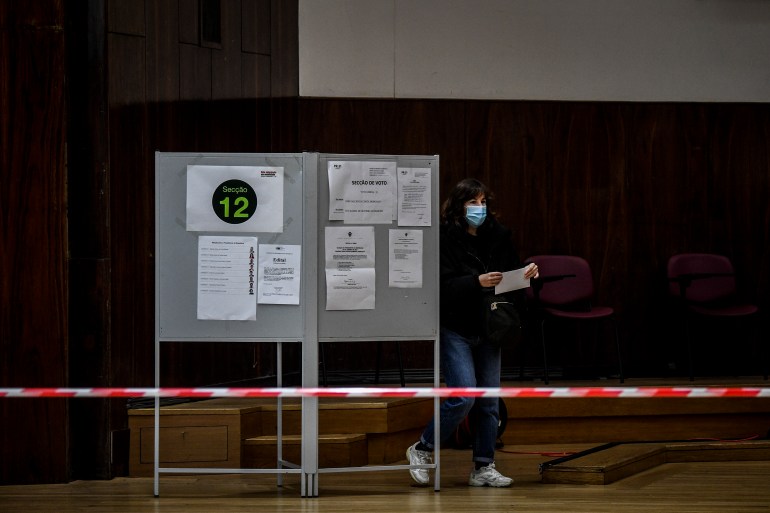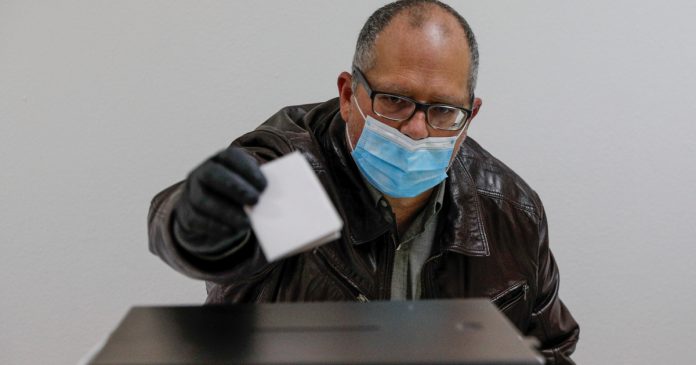[ad_1]
Portugal held its presidential election on Sunday with the moderate incumbent candidate strongly favoured to win a second five-year term while COVID-19 cases reached record levels.
Voters queued up as polls opened in the Lisbon parish of Santo Antonio, guided by red stickers on the ground marking the two-metre (six-foot) gap.
“I’m here among the first to avoid groups and queues,” Cristina Queda, 58, said as she waited. “Since the date of the elections wasn’t changed, I decided to come early to avoid that situation.”
The head of state in Portugal has no legislative powers, which lie with parliament and the government, but is an influential voice in the running of the country.
Marcelo Rebelo de Sousa, 72, is regarded as the clear front-runner among seven candidates. He is an affable, approachable law professor and former television personality who as president has consistently had an approval rating of 60 percent or more.
To win, a candidate must capture more than 50 percent of the vote. But a severe surge in coronavirus infections in recent days could keep turnout low and perhaps lead to a runoff between the two top candidates, which would take place on February 14.
Portugal has increased the number of polling stations and allowed for early voting to reduce crowding on election day.
World’s highest infection rates
Portugal has the world’s highest rates of new daily infections and deaths, according to a tally by Johns Hopkins University, and the public health system is under huge strain.
Authorities reported a record daily toll of 274 deaths and more than 15,300 new cases on Saturday, with ambulances queuing for several hours at hospitals full to capacity.
“I don’t agree that the date wasn’t changed,” said Jose Antonio Queda, 72, who also came early with his wife. “If we’re in confinement, we should be avoiding the virus as much as possible.”
With the country in lockdown, the election campaign featured none of the usual flag-waving rallies or other large public events, though restrictions on movement were lifted for polling day. Voters were asked to take their own pen and disinfectant to polling stations.
Among the incumbent’s six challengers, right-wing populist André Ventura has attracted curiosity as the first ultra-conservative to break into Portuguese mainstream politics.
 Portugal has increased the number of polling stations and allowed early voting to reduce crowding on election day [Patricia De Melo Moreira/AFP]
Portugal has increased the number of polling stations and allowed early voting to reduce crowding on election day [Patricia De Melo Moreira/AFP]Keep it to one round
In his final campaign speech, Rebelo de Sousa – one of the rare politicians often referred to simply by his first name – urged voters to back him so as to avoid a second round.
That would “spare the Portuguese people from the election being stretched out over three crucial weeks” – time that could be better spent slowing the pandemic, the former minister and co-founder of the centre-right Social Democratic Party (PSD) said.
“An abstention rate of 70 percent would be enough to make a second round almost unavoidable,” the 72-year-old warned.
Low turnout could also upset the expected easy win for Rebelo de Sousa, with polls giving him 58 percent of the first-round vote – far ahead of socialist challenger Ana Gomes and Ventura, on 15 and 10 percent, respectively.
A first-round re-election would fit in with Portugal’s experience since adopting democratic government in 1974, with all four of the president’s predecessors securing a second five-year term this way.
Far-right challenge
Rebelo de Sousa’s popularity with voters has not suffered from his indulgence of Prime Minister Antonio Costa’s socialist minority government.
He is so well-liked that the socialist party did not see the need to put up a candidate, denying its backing to 66-year-old Gomes, a former diplomat and European lawmaker turned anti-corruption activist.
Meanwhile, Ventura, the 38-year-old founder of right-wing populist party Chega (Enough) said he is in the running to “crush the left”, which is fielding three out of the seven candidates.
Portugal has so far been largely spared the anti-establishment surges from the right that have reshaped the political landscape in many larger EU nations in recent years.
Ventura secured his party’s first and only parliamentary seat at 2019 legislative elections, winning the backing of 70,000 voters or 1.3 percent.
Polls opened at 8am (08:00 GMT). Media projections of results will begin once polls close at 20:00 GMT in Portugal’s Azores islands.
[ad_2]
Source link











